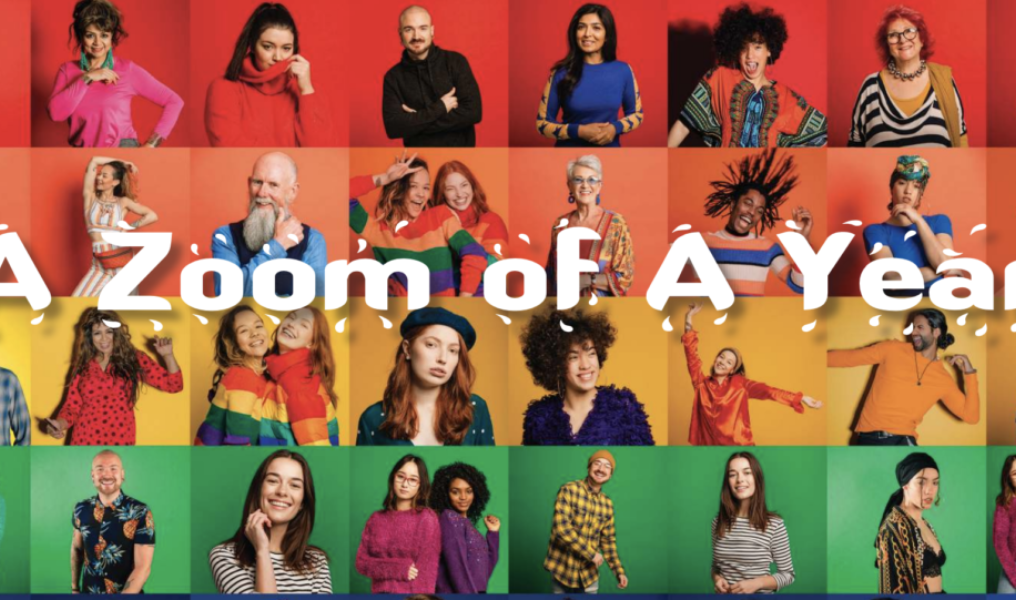As 2020 winds down, conducting meetings via Zoom or phone calls seems like an average day of work for many Michiganders. But back in March when the first stay-at-home order was put in place by Gov. Gretchen Whitmer because of the novel coronavirus pandemic, the 70-day long period was a time of intense adaptation and uncertainty. Considering how prevalent video and teleconferencing has become, it wouldn't be far-fetched to say that Zoom — and its counterparts — has both kept up the workplace status quo in some respects and ushered in a new age of working from home as the standard. Between The Lines reached out to several of Southeast Michigan's biggest LGBTQ organizations to get a sense of how Zoom has altered their standard workdays.

Courtesy photo.
Affirmations — Kyle Taylor, Development and Community Relations Manager
1. When did you learn that your office would be switching to primarily/partially remote work?
We made the decision to start working remotely once the first lockdown occurred back in early March as a safety precaution for our staff members.
2. How did that switch impact the services you provide? Did it result in fewer or adapted in-person offerings?
Our staff had to work round-the-clock to help implement our services from in-person to virtual. This included our many support and discussion groups, youth programs and counseling services. The Lettuce Help Food Program was established when many of our funders wanted to switch gears to assist with emergency services. You could say that there's been a silver lining with our programming going virtual, since, before, folks could only access our services if they came into our building. Now, folks from all over are able to access those services.
3. What's the biggest challenge you've had because of telecommunications work?
As a small team, it has taken us a bit to get used to the different atmosphere that comes along with working in a virtual world. Our staff meetings were usually heavy brainstorming sessions when hosted in-person, so it took some adapting for us to become used to things like slight audio delays and other Zoom-related issues.
4. What's something that's been made easier or better, if anything, by shifting to this kind of work?
Again, I would say that going virtual has provided many more folks the accessibility to our services at Affirmations.
5. Do you feel that you'll continue using Zoom or related services even after the pandemic?
We foresee a hybrid format going forward once we are able to reopen the building.
Affirmations is an LGBTQ community center based in Ferndale. Learn more about its offerings at goaffirmations.org.

Curtis Lipscomb. BTL Photo: Andrew Potter.
LGBT Detroit — Curtis Lipscomb, Executive Director
1. When did you learn that your office would be switching to primarily/partially remote work?
On March 6, LGBT Detroit was initially aware of a national scare that caught our attention located in Northwest America. That date was the beginning of an awareness to switch from a primary to a partial work environment. My staff was gravely concerned, and I immediately authorized permission to leave the premises. It wasn't until my birthday on March 23 that there was a formal decision for LGBT Detroit staff to begin to work from home.
2. How did that switch impact the services you provide? Did it result in fewer or adapted in-person offerings?
The switch from working onsite to remotely was incredibly overwhelming and impactful. We were immediately unprepared is an understatement to this other type of emergency. Prior, we operated in an expected and traditional manner like most community centers — face-to-face engagements, direct services operations and on-site activities occurred daily.
While there was an initial shock, LGBT Detroit has, since its inception, risen to the challenge of providing services for our movement — the pandemic was no exception. 2020 saw some of the most programming we've had in recent years, and we were able to reach an even broader audience with technology eliminating some barriers to access.
3. What's the biggest challenge you've had because of telecommunications work?
The biggest challenge LGBT Detroit faced was the understanding of how to respond to a new type of emergency. Adapting to change is hard … especially during the beginning of a world crisis. LGBT+ people know this. We've been through this before. Also, learning new programs that enable us to work effectively and to communicate efficiently was the primary concerning issue this spring season. Lastly, locating unrestricted funding to purchase enough mobile technology within a short period of time was an incredibly stressful occasion.
4. What's something that's been made easier or better, if anything, by shifting to this kind of work?
The easiest part about the shift to this work is that many of our donors and friends understood immediately how difficult this could be for us. Because of the support of persons that understood what it meant to stay connected to the community and [that] to deliver services is [very] important to us made the stress more bearable. Also, the good news is that we were able to leverage resources and tools to be able to make the shift. It was necessary for us to communicate to the world how we were going to effectively deliver programs and services.
5. Do you feel that you'll continue using Zoom or related services even after the pandemic?
LGBT Detroit will continue to use Zoom and other popular social media communication platforms. We have established practices that have been successful within the year and will continue to use them. With the evolution we've undergone this year, we're excited for both the expansion in programs as well as the integration of virtual services and programs to our robust offerings of in-person resources.
For over 20 years LGBT Detroit has been aiding the LGBTQ community in Detroit unwaveringly. Learn more about the organization online at lgbtdetroit.org.

Angie Perone. Courtesy photo.
SAGE Metro Detroit — Angie Perone, Executive Director
1. When did you learn that your office would be switching to primarily/partially remote work?
SAGE Metro Detroit is unique in that we operate more like a virtual community center. Before COVID-19, we already had an infrastructure in which our team all worked remotely. COVID, however, drastically changed how we engaged the LGBTQ older adults we serve.
2. How did that switch impact the services you provide? Did it result in fewer or adapted in-person offerings?
SAGE Metro Detroit engages in advocacy, direct services, trainings and information dissemination directly in the community. The COVID-19 pandemic severely disrupted much of that. We already had a robust telephone matching program that was designed to provide social support between LGBTQ older adults and volunteer callers — many of whom are also older adults. COVID-19, however, increased the demand for this program by 70% and doubled the duration of calls as participants' needs grew and became more complex. As the demand for our services grew, we adapted our services to provide food delivery, tablets and tech support, and virtual programming. We also transitioned to virtual trainings and created an interactive resource website to accompany our Rainbow Resource Guide.
3. What's the biggest challenge you've had because of telecommunications work?
The biggest challenge has been the inability to connect in-person to our community. Interestingly enough, our increased virtual programming has increased our outreach and the number of people we serve. However, the digital divide that exists for many of the communities we serve has posed new challenges to ensure we reach the diverse LGBTQ aging community that we serve.
4. What's something that's been made easier or better, if anything, by shifting to this kind of work?
Prior to COVID, we rarely used Zoom. Zoom has helped us connect with our SAGE team, community partners and the LGBTQ older adults we serve in new ways that have expanded our outreach and services. We have also doubled or tripled our participants in our larger virtual events by using Facebook Live. However, the digital divide that exists for many of the communities we serve continues to pose challenges to reaching the diverse LGBTQ aging community that we serve.
5. Do you feel that you'll continue using Zoom or related services even after the pandemic?
Yes — we will likely continue to use Zoom after the pandemic in a hybrid format to allow us to continue reaching a wide audience. Zoom's dial-in feature allows those who do not have internet to connect; although, they are unable to access some of the tools by dialing in. A hybrid format that incorporates in-person and Zoom should maximize our outreach and ability to serve a diverse service population.
SAGE Metro Detroit is part of a national network working aid and service LGBTQ elders. Learn more about the local branch online at sagemetrodetroit.org.

Erin Knott. Courtesy photo.
Equality Michigan — Erin Knott, Executive Director
1. When did you learn that your office would be switching to primarily/partially remote work?
Equality Michigan made the decision to suspend our DVS pop-up office hours on March 11, 2020, and we moved to remote work beginning March 16, 2020.
2. How did that switch impact the services you provide? Did it result in fewer or adapted in-person offerings?
Department of Victim Services: The DVS team has had to adapt how they provide crisis services to LGBTQ+ people who are experiencing discrimination, harrassment and violence. As previously stated, we have suspended our in-person, pop-up office hours and have had to rely on outreach and educational efforts from makeshift home offices to provide critical services to those experiencing trauma. We have also utilized Zoom and Facebook Live to promote our services and to hold virtual office hours with our partners across the state.
Fundraising/Mission Equality: Fundraising was also a challenge as we have had to cancel many regional house parties, our Lansing/Capitol Road Rally and move our annual reception, Mission Equality, to a virtual event. It was hard to admit that a packed room in Detroit at the Roostertail wasn't going to be possible because of the pandemic. That led to new challenges including determining what format to use virtually, how to make it fun and inclusive for our guests and how to communicate to sponsors that funding for our programs and services are still needed even if our guests at Mission Equality will not be able to interact with sponsors the same way. I should point out the great opportunities turning virtual provided, specifically traveling to the event wasn't a barrier for our guests, and we had people from all over Michigan participating. Additionally, we were able to secure an amazing keynote speaker in Dominique Jackson.
3. What's the biggest challenge you've had because of telecommunications work?
Fundraising has been especially difficult. In addition to the economic impact of the pandemic, 2020 was also an important political year. Organizations like Equality Michigan were competing for resources with candidates up and down the ballot. Additionally, we learned from other nonprofit organizations that ticket sales and sponsorships were down, which forced us to adjust our goal and expectations. It became even more obvious that fundraising would suffer as we made fundraising calls to past donors asking for their support. Several were impossible to follow up with because their offices were closed, many told us they were focusing on emergency basic needs, and some decided not to give at all because their own future was uncertain. And, while there is no doubt that this pandemic has disproportionately impacted the LGBTQ+ community, we are not the only community being affected. We also had to spend a great deal of time usually reserved for fundraising focused on learning how to put on a virtual event.
4. What's something that's been made easier or better, if anything, by shifting to this kind of work?
Expanding our reach to people who might not have been able to participate or get involved with us if we hadn't been forced to go virtual. Utilizing new technology such as tools that support text banking, which we used to talk to nearly 700,000 pro-equality voters this past election.
5. Do you feel that you'll continue using Zoom or related services even after the pandemic?
Yes, Zoom and other technologies will be incorporated into our work. There have been many best practices learned, in addition to the ability to reach a wider audience in the work. This will not be the only tool used for engagement but it will still be an important avenue to connect with the greater LGBTQ+ community in the future.
Equality Michigan is a statewide LGBTQ political advocacy organization that for 25 years has worked to stop violence against the community. Learn more about it online at equalitymi.org.










